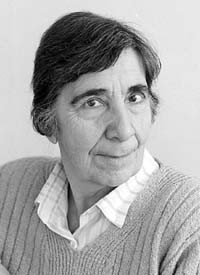All that is going on around us assumes a brilliant political coloration, with the current census in Ukraine being no exception. This domain is, like the British Parliament, a place of a bitter competition between two parties, those who speak Ukrainian and those who speak Russian. Each suspects cheating and doctoring everywhere, each accuses the authorities of bias, both of them call on people not to fall victim to provocation and to fill out the questionnaires giving the truth, the whole truth, and nothing but the truth, i.e., to fearlessly call themselves as either Ukrainian or Russian speaking. Both groups are convinced that the census results will be fixed, that the number of, say, Russians and Russian-speakers will be radically underrated, which is, after all, the ultimate purpose of this horrible provocation called the census. Both sides are utterly indignant over how the questions are worded in the census forms, which testifies, incidentally, in favor of those questions. The antagonists from both sides believe that the census results will simultaneously understate the number of both Russian and Ukrainian speakers, which will in turn entail the introduction of a second official language as well as further discrimination against what used to be called the great and powerful Russian language in this country. Of Ukraine’s Russian speaking citizens, especially active are the Russian communities in the southern and eastern regions. For instance, Odesa residents saw hundreds of thousands of leaflets calling on “citizens of New Russia” (tsarist name for the region) not to be afraid and boldly say who they are. Quite active in getting the flock ready for the dread census are the clergy of the Odesa-Ismayil diocese of the Ukrainian Orthodox Church (Moscow Patriarchate). The Odesa priests loyal to Moscow do not exactly champion, as you might have guessed, the revival and wide use of the language spoken by most Ukrainian citizens.
In general, it sometimes begins to seem that some time machine has taken you to the Middle Ages, to the epoch of the first censuses in the Russian Empire (which, incidentally, recorded only males). People were highly suspicious of and anticipated the worst from censuses. Sometimes it would even come to rebellions: peasants were ready to face death rather than have their names placed on the diabolical lists.
Meanwhile, everything is not as dramatic as the “census politicians” claim. I recently happened to visit Donetsk, a supposed stronghold of the Russian language. Going there, I took a vow, not without some fear, to speak only Ukrainian, the fear being caused by my recent exchange of opinions in Kyiv with activists of Donetsk Regional Orthodox Brotherhoods. I kept my promise on the train, at the railway station, on the streets, in cafes, and official institutions. And not even once did my language provoke open hostility, rudeness, or unwillingness to answer. There were even instances when the people I turned to tried to answer, as best they could, in Ukrainian. I even felt ashamed of my premonitions. I visited, on business, Donetsk’s Tuhan-Baranovsky State University of Economics and Trade, a typical Russian-speaking educational institution, as far as I knew. But today a considerable number of courses are taught in Ukrainian, although this encounters serious difficulties, such as the absence of generally-accepted terminology and textbooks, as well as a shortage of Ukrainian-speaking teachers. I discussed this problem with Professor Volodymyr Filipov, advisor to the rector. As he told me that the original plan was to form separate Ukrainian and Russian language student groups. But, with this amounting to segregation, it was decided to teach some courses in Russian and others in Ukrainian. Departments are actively drawing up bilingual terminological dictionaries, not so easy a task (the results of the work of the Academy of Sciences Institute of Scientific Language were banned in 1930, so virtually nobody here really knows the language they were creating then, but it does exist — Ed.). Mr. Filipov added, “Why should we renounce bilingualism, which always enriches a person? Besides, I believe Russia will always be a neighbor of ours. Let us not follow the way of the previous regime, which in fact broke with the pre-Revolutionary tradition of knowing and using European languages. Just read Tolstoi’s War and Peace: it has whole pages of French text!” (Let us add that those pages were footnoted in Russian translation only in the Soviet editions.)
The census is drawing to a close, and it will take still much time to process the results. Will they add any new and unexpected touches to the present-day blurred image of a Ukrainian or citizen of Ukraine, for that matter? Will the results help us find out who we really are or, to be more exact, who we think we are?







